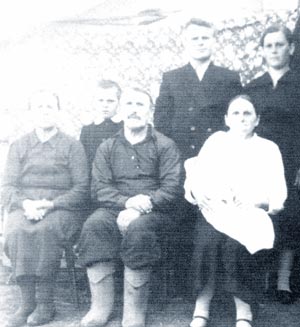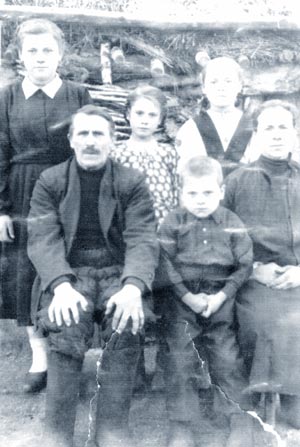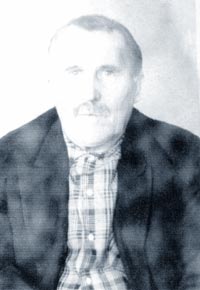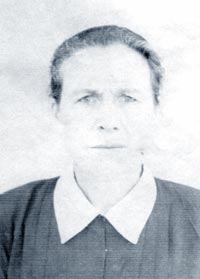









Author: Viktoria Igorevna Dzhebko
Project leader: Galina Pavlovna Dzhebko, history teacher
Krasnoyarsk Territory, Nazarovo District, small town of Sakhapta
“The Searchers” Association
Municipal educational institution Secondary School of Sakhapta (general
education)
In my little home town Sakhapta people of different nationalitites live side by side: Russians, Ukrainians, Belorussians, Chuvashians, Armenians, Germans. A very süpecific part of the history of our country is closely connected with each of these peoples. The Russians have made themselves feel at home in Siberia in the course of many centuries. Ukrainians and Belorussians came to this place late in the 19th, early in the 20th centuries, in order to escape their poverty-stricken villages. The Chuvashians were forced by famine to leave the Volga Region and resettle in Siberia in the 1920s. The Armenians began to appear in our little town in the 1990s, when the collapse of the USSR was accompanied by conflicts among different nationalities living in their home regions.
Hower, the most terrible page in our history is related to the Germans. Not with the Fascists, not with those who invaded the country and committed crimes – I am rather talking about the Russian Germans, who have been living in Russia for several centuries, who call the country their home country, who have always honestly and diligently done their work, who raised many children. The fate of this people shows us the true sense of the word “repressions”. Whenever this word comes to my ears, I immediately imagine the millions of ordinary people who were forced to live in disgrace and the unbearable suffering of little children, who were deprived of their childhood, youth and even of their lives.
I felt very interested in the history of the German families living in Sakhapta. This paper, which is not too comprehensive, is the result of my research.
The target I set myself was to study the history of two German families – Gafner (Hafner?) and Airich, who live in our little town. Apart from this; I wanted to find out, to which extent the repressions influenced the rest of their life.
In the course of this project I recorded the memoirs of Aleksander Bogdanovich Gafner, one of the direct eye-witnesses of those horrible events, and also made use of the information about the Airich family, information which were gathered by members of the circle of local history and are now being kept with the school museum. They were the basis for this exposition. Of course, I had to become familiar with some literature, as well, which also helped me to better understand and imagine the huge dimension of the repressions inflicted on the German people, to reconstruct history and get to know the various forms of repressions. The most valuable experience, however, were my personal contacts with the living, for they reflected the true feelings of the people, which made it much easier for me to comprehend the spirit of that age and sympathize with all the agony, with all the suffering of the people involved. When looking at the photographs of the Gafner (Hafner) and Airich families, I feel particularly depressed about the eyes of the adults. They do not only reveal all the torments, sufferings and teariness, but also express great concern – concern about their children, about their future. Even nowadays, the children of those times, who are meanwhile well advanced in years, do not like to talk about the past – the after-effects of a totalitarian society are still clearly noticeable.
On the 22 July 1941 the Great Patriotic War broke out, and already on the 28 August 1941 the Presidium of the USSR Supreme Soviet passed the famous ukase “About the resettlement of all Germans from the Volga Regions”. This action was justified with the definitely far-fetched information,”that the German population residing in the Volga Rayon is harboring thousands upon thousands of subversives and spies who, given only a signal from Germany, will cause explosions to take place in the region inhabited by Volga-Germans”.
However, they did not only resettle the Germans from the Autonomous Republic of the Volga, which was completely liquidated soonafter, but also from the Stalingrad, Saratov and other regions situated in the European part of the USSR. Early in 1942 about 1.100.000 Germans had been affected by deportation,. In 1942 they began to mobilize all Germans from the age of 17 into the labour army. The trudarmists were forced to construct pits and factories, fell trees and work for coal and ore mines. After the war the situation of the Russian Germans did not improve. Many were left with so-called “labour colonies”. Only in 1947 they learned that the resettlement of the Germans would apply “for lifetime” and that leaving their place of residence without authority (escape) would inflict a penalty of 20 years of hard labour. The strict camp regime was not abolished before 1955. What can we derive from these bleak lines?
Let us have a look at the memoirs of Aleksander Bogdanovich Gafner (Hafner?), inhabitant of the small town of Sakhapta:
“I was born in the village of Morengentaun (Morgentau!), Klemantovsk District, Saratov Region, on the 14 January 1932. My father, Bogdan Bogdanovich Gafner was from a poor farmer’s family. During World War I he was called up into the Tsar’s Army; he took part in combat operations. In 1917 he became a member of the Bolshevik Party and took an active part in the organization of the Soviet power. During the Civil War he was fighting for the “Reds”. After the war he returned home, got married and worked for a kolkhoz farm”.
The life of an entirely ordinary man – a Russian, Ukrainian or Chuvashian. When I got familiar with the lives of such ordinary, simple people, they principally all told me the same thing: “I lived my life, did my work diligently and tried my best to raise my children”. I am sure that none of them was ever serious concerned about politics. The “policy” of a totalitarian system, however, did not forget about man at all. Soonafter, they began to search for enemies of the people among us. The Soviet power did not accept Bogdan Bogdanovich’s positive attitude towards the Soviet power, his merits. Already in 1937 he became enmeshed in the wheels of repressions.
“Since then the life of our family has altered considerably. Mum had to pull five children through all by her own. They suffered from pangs of hunger. The elder children were forced to accompany their mother to work in the kolkhoz fields, but nonetheless the means of subsistence did not suffice”.
 The Gafner family had not the faintest idea about what was yet in for them. The
tragedy that had affected the entire Soviet people took a second tragic turen
for the Russian Germans – deportation.
The Gafner family had not the faintest idea about what was yet in for them. The
tragedy that had affected the entire Soviet people took a second tragic turen
for the Russian Germans – deportation.
“I was 9 years old at that time. One day they announced that the Germans should get prepared for their evacuation within 12 hours. But how could they manage to get everything done within such a short period of time? We left in the clothes we had put on in the morning, just taking along a few warm garments. We had no money … (cries). They removed us in freight cars. Our trip by train took two weeks. Nobody was able to tell us where they were taking us to. Mum all the time tried to hide her face away from us, for her eyes were full of tears: if she only knew, what to feed her children with. The small amount of foodstuffs they had taken along from home were running low quickly. On the fifth day only the people on the train received some porridge…”
I am convinced that this kind of an attitude displayed by the State towards the people was not just a coincidence. Obviously, it was very convenient for them that as many as possible did not reach their final destination, but died “of natural causes”.
“The took us to Nazarovo, where we had to register with the commandant’s office. Then they sent us further to the village of Skorobogatovo. In October 1941 the called up my elder brother Jakob into the labor army and carried him off to Kirov. One year later they came for my elder sister Erna and forced her and some other girls to work for the labour army in Buryatia. Mother was left behind with three children at the age of 12, 9 and 6. The family had to live on a worker’s bread ration (500 grs). Mama was the sole one who went to work. Additionally they received 200 grs for each child. In order to be at least of some help to the family I went to herd the cattle.
 One year later, our family was transferred to the village of Sverevsk (which is
today called Staroshilovo, Nazarovo District). We lived in a dug-out and were
only able to build ourselves a mud hut towards the end of the war. In 1945 my
sister came back home. She was entirely devitalized by all the hard labour. In
1946 my brother returned, as well. Having been labelled an “enemy of the
people”, father was fated to work in the Murmansk Region for 10 years – he was
forced to take part in the construction of roads. He came home in the autumn of
1947. Father never told us about how he lived during these 10 years. The hard
compulsory labour ruined his health. He was ailing and died in 1957”.
One year later, our family was transferred to the village of Sverevsk (which is
today called Staroshilovo, Nazarovo District). We lived in a dug-out and were
only able to build ourselves a mud hut towards the end of the war. In 1945 my
sister came back home. She was entirely devitalized by all the hard labour. In
1946 my brother returned, as well. Having been labelled an “enemy of the
people”, father was fated to work in the Murmansk Region for 10 years – he was
forced to take part in the construction of roads. He came home in the autumn of
1947. Father never told us about how he lived during these 10 years. The hard
compulsory labour ruined his health. He was ailing and died in 1957”.
The other German families were to meet hard fates, too. There lives were affected by sorrow and misery, but nevertheless they were trying hard to survive.
“The Airichs arrived in Siberia early in October 1941. They had already learned about the deportations from the Volga (Saratov Region, Engels District, Village of Schwed) some time in August; for this reason the children had not gone back to school after the summer holidays, i.e. on the 1 September. The children of the Airichs had not attended school either, although Emma was to attend the 4th term, Lidia the 2nd).
The departed on the 11 September. Their family consisted of five individuals: the parents – Karl Karlovich and Sofia Andreevna, and their three children: Emma, Lidia and one-year-old Paul. Paul fell ill during the trip and died five days after their arrival. We were transported in freight cars. The trip took very long; nobody knew where they were taking us to. For a couple of days the train stopped over in Alma-Ata.
 In the spring, this happened when they still lived at home, Father Karl
Karlovich had left the house to fetch firewood from the forest. On his way he
went through the ice of the Volga. He was taken ill and remained in por health
for a long time. He arrived in Siberia as an invalid – doctors had been forced
to ampute both his legs. The family resettled in the village of Kholma, Nazarovo
District. When in the 1960s the exiled Germans were finally allowdd to leave
their places of residence, the Airich family decided to stay in Siberia: the
ailing Karl Karlovich was not in a position to leave to another place. During
the war he worked at home as a saddler: he used to sew all the saddlery for the
kolkhoz horses and resoled shoes, as well. They made their living partly on this
work. Karl Karlovich died in November 1973.
In the spring, this happened when they still lived at home, Father Karl
Karlovich had left the house to fetch firewood from the forest. On his way he
went through the ice of the Volga. He was taken ill and remained in por health
for a long time. He arrived in Siberia as an invalid – doctors had been forced
to ampute both his legs. The family resettled in the village of Kholma, Nazarovo
District. When in the 1960s the exiled Germans were finally allowdd to leave
their places of residence, the Airich family decided to stay in Siberia: the
ailing Karl Karlovich was not in a position to leave to another place. During
the war he worked at home as a saddler: he used to sew all the saddlery for the
kolkhoz horses and resoled shoes, as well. They made their living partly on this
work. Karl Karlovich died in November 1973.
 These were very bad and difficult years for Sofia Andreevna, his wife. More
children had been born to the family in Siberia, altogether they were eleven.
But bad living conditions and malnutrition impacted on their health: only five
of them stayed alive. For a long time they were forced to live densely packed in
a tiny house, consisting of only one room. In 1956 they managed to buy
themselves another little house which was a little more spacious, but it was
still very small: the children had to sleep on the floor as before”. By the way,
due to the whole situation Emma had no chance to go to school – she was
compelled to work and contribute to their maintenance. She is fighting back her
tears when recalling the cozy, little school building, her classroom, in the
little village of Schwed, where she had only been attending lessons for three
years …
These were very bad and difficult years for Sofia Andreevna, his wife. More
children had been born to the family in Siberia, altogether they were eleven.
But bad living conditions and malnutrition impacted on their health: only five
of them stayed alive. For a long time they were forced to live densely packed in
a tiny house, consisting of only one room. In 1956 they managed to buy
themselves another little house which was a little more spacious, but it was
still very small: the children had to sleep on the floor as before”. By the way,
due to the whole situation Emma had no chance to go to school – she was
compelled to work and contribute to their maintenance. She is fighting back her
tears when recalling the cozy, little school building, her classroom, in the
little village of Schwed, where she had only been attending lessons for three
years …
How did the repressions influence the lives of these people? The Gafners got at first separated from the father, then from brothers and sisters. Compulsory labour which surpassed the people’s forces, ruined their health. On their way into exile the Airichs lost one of their children – their little son which they had so long been waiting for. They had to live in extraordinarily unfortunate circumstances. At that time, many people lived under adverse conditions, but in my opinion the fate of the special resettlers is yet more tragic – for they got separated from their beloved relatives. And what is even worse: they were labelled criminals, “enemies of the people”. Until today they have not been able to acquit themselves from this tarnish. And this is way they still do not like to recall and talk about those years.
1. Aleksander Bogdanovich Gafner (interview)
2. Emma Karlovna Schnapp (interview)
3. Book of Memory – in commemoration of the victims of political repressions in
the
Krasnoyarsk Territory: vol. 1, Krasnoyarsk, 2004.
4. The Krasnoyarsk Territory in the history of our fatherland: Reader for
students,
Krasnoyarsk, 2000.
5. Book for teachers. History of political repressions and resistence against
bondage in the
USSR, Moscow, 2002.